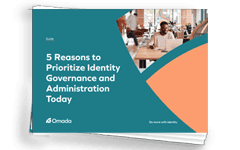Let's Get
Started
Let us show you how Omada can enable your business.
• Full-featured IGA
• Configurability without code
• Best-practice framework for solution design and deployment
• High degree of configurability
• Intelligent compliance
• Manage identities and access across hybrid platforms
• Support at every step of your IGA journey
• Personalized service package to accelerate your deployment
• Avoid common pitfalls and get value in 12 weeks
• Iterative implementation roadmap
• Standardized, well-documented best practices
• Support from Omada-certified project managers, architects, and consultants
• Stellar Customer Success Team
• Quick and professional Service Desk
• Access to ITSM system and KPI reports
• Digital self-paced and instructor-led courses
• Training on demand through our Premier Academy subscription
• Individual, role-based learning plans and certification paths
• Ensure fast and successful IGA deployment
• 5-step process with clear exit criteria
• 12 weeks time to value
• Helps support enterprise IT security
• Makes it easier to meet compliance mandates
• Automates access provisioning and enables the workforce from day 1
• Automated access provisioning and deprovisioning
• Least privilege and separation of duties policies
• Simple-to-run certification campaigns
• Access compliance status dashboards
• Cross-system certification campaigns
• 50+ audit report templates
• Identity lifecycle management
• Automatic access provisioning
• Self-service access requests
Omada provides Governance for Identity Fabric ensuring compliance regulations are met, security and efficiency around identity workflows are maintained.

A definite guide to Identity Governance and
Administration best practices. Learn how to
successfully deploy and maintain an IGA solution.

Our comprehensive Identity and Cybersecurity
glossary, featuring extensive explanations, real-life
examples, practical frameworks and everything else
you need to understand key concepts in identity and
cybersecurity.

In this Guide, Gartner has identified Omada as a
Representative Vendor in IGA. Use it to evaluate top
Identity Governance vendors and anticipate future
trends, features, and capabilities in the IGA market.

Familiarize yourself with the typical threats that
can derail a seamless legacy to cloud migration of
IGA functionality and get tips on managing them.

As part of their digital transformation, DEKRA moved
from an in-house access management solution to
a modern, cloud based Omada IGA solution.

Get practical examples and data proving the
value of IGA and learn the five key reasons you
must make it a business imperative today.

Explore our white papers on compliance, security, and
efficiency topics. Gain insights and best practices to drive
informed decisions and enhance your organizational strategy.

We are constantly adding new features to Omada
products to ensure your IGA efforts keep pace with
the ever-evolving threat landscape.

Get information about the newest Omada product
features, benefits, and use cases to ensure you get
the most from your IGA program.

Participate in interactive product demos covering
capabilities such as Delegate Access, Request
Access, Approve Access Request, and more.

Get the latest IGA trends, information, and intelligence
from renowned industry experts in Omada’s live and
on-demand webinar presentations.

A market-leading provider of identity governance
and administration solutions. Get to know us better!

At Omada, efficient teamwork creates extraordinary results.
We enable talented people to create career paths where
they can thrive, be inspired, and have fun.

Omada partners provide unmatched advisory, product
and service re-sale, and project delivery resulting in
unsurpassed customer satisfaction scores.

Don’t just take our word about the value of Omada
solutions. See what actual users think.

See what the media are reporting about our
innovative identity governance solutions.

We frequently deliver expert presentations, exhibit, and
run demos at the world’s leading security and IGA events.
Look at our upcoming schedule to see if we cross paths –
we'd love to speak with you.

Omada is a winner for a third consecutive year in the 7th
annual CyberSecurity Breakthrough Awards program.

Omada is a global market leader in Identity Governance.
Please reach out to us with questions or to get more information.

Find here legal documents governing and relating to the
provisioning of Omada Offerings - Customer Agreement, DPA, and more.
• Full-featured IGA
• Configurability without code
• Best-practice framework for solution design and deployment
• High degree of configurability
• Intelligent compliance
• Manage identities and access across hybrid platforms
• Support at every step of your IGA journey
• Personalized service package to accelerate your deployment
• Avoid common pitfalls and get value in 12 weeks
• Iterative implementation roadmap
• Standardized, well-documented best practices
• Support from Omada-certified project managers, architects, and consultants
• Stellar Customer Success Team
• Quick and professional Service Desk
• Access to ITSM system and KPI reports
• Digital self-paced and instructor-led courses
• Training on demand through our Premier Academy subscription
• Individual, role-based learning plans and certification paths
• Ensure fast and successful IGA deployment
• 5-step process with clear exit criteria
• 12 weeks time to value
• Helps support enterprise IT security
• Makes it easier to meet compliance mandates
• Automates access provisioning and enables the workforce from day 1
• Automated access provisioning and deprovisioning
• Least privilege and separation of duties policies
• Simple-to-run certification campaigns
• Access compliance status dashboards
• Cross-system certification campaigns
• 50+ audit report templates
• Identity lifecycle management
• Automatic access provisioning
• Self-service access requests
Omada provides Governance for Identity Fabric ensuring compliance regulations are met, security and efficiency around identity workflows are maintained.

A definite guide to Identity Governance and
Administration best practices. Learn how to
successfully deploy and maintain an IGA solution.

Our comprehensive Identity and Cybersecurity
glossary, featuring extensive explanations, real-life
examples, practical frameworks and everything else
you need to understand key concepts in identity and
cybersecurity.

In this Guide, Gartner has identified Omada as a
Representative Vendor in IGA. Use it to evaluate top
Identity Governance vendors and anticipate future
trends, features, and capabilities in the IGA market.

Familiarize yourself with the typical threats that
can derail a seamless legacy to cloud migration of
IGA functionality and get tips on managing them.

As part of their digital transformation, DEKRA moved
from an in-house access management solution to
a modern, cloud based Omada IGA solution.

Get practical examples and data proving the
value of IGA and learn the five key reasons you
must make it a business imperative today.

Explore our white papers on compliance, security, and
efficiency topics. Gain insights and best practices to drive
informed decisions and enhance your organizational strategy.

We are constantly adding new features to Omada
products to ensure your IGA efforts keep pace with
the ever-evolving threat landscape.

Get information about the newest Omada product
features, benefits, and use cases to ensure you get
the most from your IGA program.

Participate in interactive product demos covering
capabilities such as Delegate Access, Request
Access, Approve Access Request, and more.

Get the latest IGA trends, information, and intelligence
from renowned industry experts in Omada’s live and
on-demand webinar presentations.

A market-leading provider of identity governance
and administration solutions. Get to know us better!

At Omada, efficient teamwork creates extraordinary results.
We enable talented people to create career paths where
they can thrive, be inspired, and have fun.

Omada partners provide unmatched advisory, product
and service re-sale, and project delivery resulting in
unsurpassed customer satisfaction scores.

Don’t just take our word about the value of Omada
solutions. See what actual users think.

See what the media are reporting about our
innovative identity governance solutions.

We frequently deliver expert presentations, exhibit, and
run demos at the world’s leading security and IGA events.
Look at our upcoming schedule to see if we cross paths –
we'd love to speak with you.

Omada is a winner for a third consecutive year in the 7th
annual CyberSecurity Breakthrough Awards program.

Omada is a global market leader in Identity Governance.
Please reach out to us with questions or to get more information.

Find here legal documents governing and relating to the
provisioning of Omada Offerings - Customer Agreement, DPA, and more.
Home / What is Identity Analytics?


Identity Analytics is the process that identity and access management practitioners use to get actionable intelligence into how employees, vendors, contractors and other users of an organization’s IT infrastructure access and use applications and sensitive information. Identity analytics leverages functionalities such as access log analysis, machine learning (ML), and other advanced technologies to help organizations gain insight into the overall health of their Identity Governance and Administration (IGA) program. It is a critical component of modern identity and access management (IAM) systems, helping organizations make better decisions, improve user experiences, enhance security, ensure compliance with regulations, and reduce the overall TCO of their IAM strategy.
Traditionally, organizations used manual role definition processes to gain insight into the strength of their IGA posture. At baseline, this was a time-consuming and error-prone effort; and keeping pace with organizational changes was a constant struggle.
Today, as organizations move more applications and sensitive data to cloud-hosted environments, they need to innovate to eliminate outdated permissions, reduce the number of security vulnerabilities, and improve inefficient access control processes. The advanced modern Identity Analytics processes offered by SaaS-based IGA solutions are essential for organizations trying to streamline and improve role management and identity governance in new environments.
Leveraging Identity Analytics helps organizations streamline role management, enhance security, and equip their IGA team with the data-driven insights they need for optimal access management and consistent compliance adherence.
See how Omada Identity Analytics provides true innovation to help your organization meet business and regulatory challenges, make better decisions, and lower identity and access management costs in the process.



